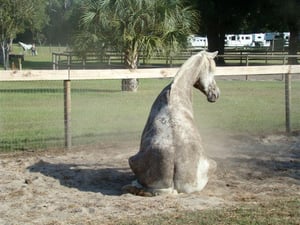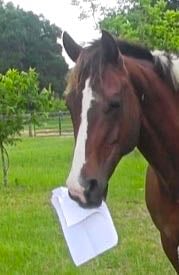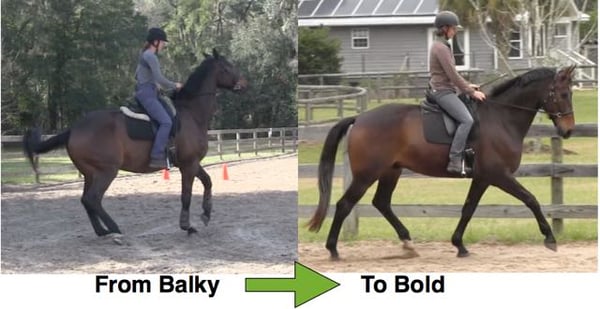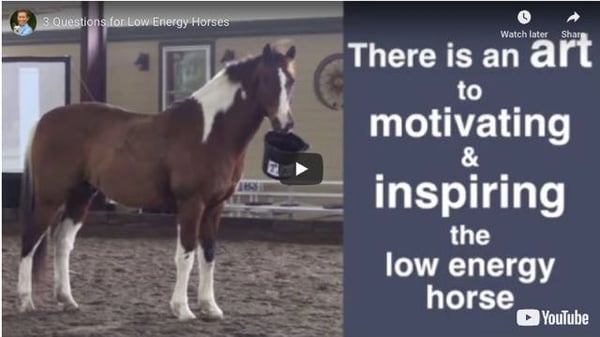(5 minute read. Includes videos)
My first thought for training low energy horses is to not call them lazy. Lazy implies there is something they 'should' be doing, and really all any horse should be doing is what ever they feel like doing. As soon as we come along and have an expectation, it becomes our responsibility to not only teach them what we would like them to do but also inspire them to do it.

Low energy horses can be a challenge because they don't give you much to work with. Any rider who has ever met a horse who just says 'NO' understands the importance of knowing how to motivate and inspire, because no amount of pushing can force a horse to do something he doesn't want to do.
I've turned around several horses who have big stops in them (horses can refuse even without a jump in front of them). It IS possible for them to become more open to suggestion but it is a gradual process and the 'stop' can come back if you lose their trust or get greedy.
Check your own aids.
Many horses that are called 'lazy' are simply desensitized from aids that stay on too long and become meaningless, or aids that are conflicting. It takes skill to be able to apply aids to ask your horse to go without tensing in your body or thighs or arms (which will cause the horse to slow down). The first step in motivating a low energy horse is to take your aids OFF. Stop pushing, release your own tension and get out of your horse's way. The next step is to think about more than just making your horse's rear end go.
The following are some concepts that can help. Don't wait until your horse is all the way shut down before using these!
Check For Physical Reasons
Sometimes low energy horses are quite stoic types and may not be expressing pain or discomfort in a dramatic way. Analyze their nutrition, check for ulcers, take a good look at their feet, consult with your veterinarian, check your tack.
Make It YOUR Responsibility...
Many trainers have a philosophy that horses should do what they are told simply because 'they said so' but that assumes that obligingness is the horse's responsibility and duty. For me, everything they do for us is a gift. The full responsibility is on me, the trainer, not the horses to achieve any results.
Do What Your Horse Likes To Do...
There are two ways to achieve harmony:
1) Get your horse to do what you are asking.
2) You do what your horse wants to do.
With low energy horses Option 2 is much easier! Find what your horse likes to do, and join him in that. You need to find something that you can ask for that he will say 'YAY!' to. If everything you ask for is something he doesn't want to do, then he will just tune out.
 Your horse may love picking things up with his mouth. Great - Put a cue to it and play that game often! He will have more experiences of getting a cue, doing something, and enjoying it. This will build his trust in you. It is a great opportunity for you to practice your timing and rewarding system. Use this game to teach him the precise moment he has been successful. It will help him understand that when you give a cue, there is something specific he can do in order to be rewarded.
Your horse may love picking things up with his mouth. Great - Put a cue to it and play that game often! He will have more experiences of getting a cue, doing something, and enjoying it. This will build his trust in you. It is a great opportunity for you to practice your timing and rewarding system. Use this game to teach him the precise moment he has been successful. It will help him understand that when you give a cue, there is something specific he can do in order to be rewarded.
If your horse loves standing still, teach him to stand on a mat or behind a pole. You'll be his hero! Similar to the above example, it will be an easy way for him to be successful, and if he walks off it will give you opportunities to remind him he needs to stand still. This will give you a nice new conversation to have with him instead of you always asking him to move.
If a horse gets sticky in the arena when you ask him to stay on precise lines of travel, then let him go wherever he wants! He's not 'getting away with something' because it is your idea. Of course do this in an area where you can be safe. I have had horses that are sticky even in a field, but if I dropped the reins and let them choose the line of direction they start having fun. It can be pretty interesting to see where they go. I have had horses do U-turns every 20 meters for 5 minutes, or just do small circles until they finally decide to go somewhere different. This moment of the horse changing his mind and deciding to do something else is priceless. Acknowledge that he showed initiative! Once they realize they can can go where they want, they get happier to do it.
All of these set you and your horse up to more easily find harmonious moments to enjoy together.
Sometimes you will have to get creative. Check out this video below:
Create End Points...
So many times I hear instructors telling students with low energy horses to 'keep him going' or 'keep your leg on' or 'don't let him fall asleep'. Uch, this is exactly what NOT to do with a low energy horse. Think about it: You have a horse who wants to conserve his energy. The longer he thinks the session may go on, the more he will be sure he should save his energy.
You need to prove to him that there are end points. Put periods on the ends of your sentences. Conversations with low energy horses need to be short and precise. The last thing you want him to think is that you are going to 'keep him going forever'.
The tasks you ask of him need to be able to be accomplished quickly and are rewarded by resting. Cookies are great too, but doing nothing is the greatest reward for these types! Make sure you can slow down. For some riders, taking even a 30 second break in the middle of a ride can seem like an eternity. Some riders get triggered by low energy horses and get obsessed with trying to push them when the best thing they can do is stop and take a break.
Seek to get faster responsiveness to smaller requests and reward successes immediately. Don't even try to sustain something he didn't willingly offer in the first place. The goal is him being open and willing to put in effort.
Acknowledge every time he puts in effort and value effort over results. Praise him for high energy 'mistakes'. With that said, be progressive; some horses are low energy because they are bored.
You will be amazed at how much effort a horse will put in when they know there is an end point on the horizon.

Be A Brilliant Conversationalist
Have you ever met a person that just goes on and on and on when they talk? Have you zoned out only to have them suddenly ask you a question and you're like: 'Huh? What?' or you give an answer like: 'oh... Yes, uh huh' and you hope you can get away with it? A lot of conversations between horses and their riders are like that. Don't hold your aids on (especially if they didn't work in the first place). Music is the silence between the notes.
Target willingness and success in the small moments you might normally miss. So many times riders have incredibly low standards in conversations with their horse about moving over in the grooming stall, or leading. They prove to their horses over and over that most of what they say is ignorable and meaningless - then they get in the arena and suddenly they expect the horse to spring into action when the work is hard or complicated. Be clear. Expect answers to your requests. Let your horse know how he did. Clarify confusion. Reward generously.
Don't keep re-teaching the alphabet to your horse. Once you have communication, gradually make the conversations more interesting and complex.

Karen Rohlf simplifies and explains complex training issues,
and empowers you with the confidence to get results.
Increase Relaxation
This is counter-intuitive but sometimes low energy horses are actually missing relaxation. Some horses work hard to not put in effort. The tension in their body is what is holding them back. From a physical point of view, it is a simple fact that in order for you to use a muscle, the antagonist muscle has to allow it. It's a physical fact, but the tension most often originates from a mental or emotional reason.
Figure out what your horse is defensive about. Why does he feel like he has to hold tension? What is he protecting himself from? Look for the very small signs. These horses typically won't explode or prance around when they are nervous. They'll go inside and start to move like stiff robots. This is another reason why it is so important for you, the rider, to not get impatient.
With low energy horses, I spend much more time doing nothing and just relaxing than I do asking them to do something. Be trust-worthy. Let your touch make them feel good. Massage them. Hang out with them. Look for the small openings they give you and thank them for their trust in you.
When they trust you, they will give you everything. The horses that I have turned around from balky to bold have been so special to me. The strength-of-will that they used to not go can be channeled to a positive strength. The trust that you build goes deep.The trust may or may not be transferable to other people. They will really become your horse.
I hope that helps!
Here is a video (11 minutes) you may enjoy where I summarize some of these concepts. (25+ of the hundreds of videos in the Video Classroom are about the conversation of Energy with horses)





